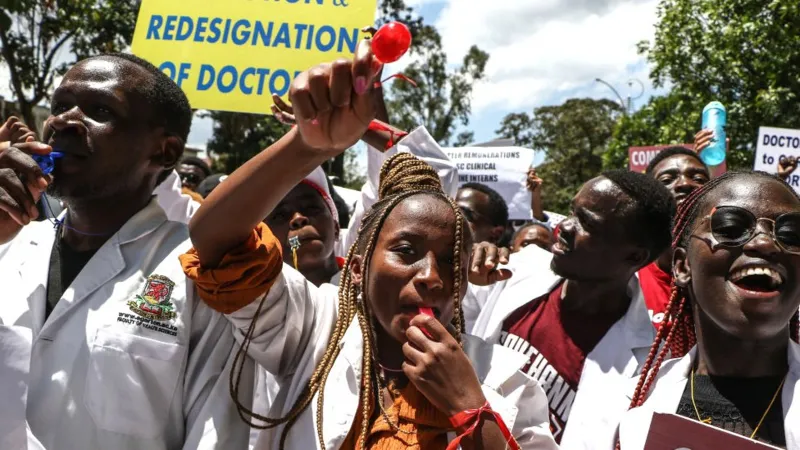Kenya Healthcare Crisis: Balancing Needs Amid Doctor Strike
The labor ward at Kihara Level 4 Hospital, situated on the outskirts of Nairobi, Kenya’s capital, presents a stark picture. Rows of beds lie empty, with only a fraction occupied. A nurse confides that they’re unable to admit women in need of Caesarean sections due to the absence of doctors. Across the country, doctors have been on strike for a month, rendering public hospitals eerily quiet, devoid of the usual hustle and bustle.
This strike has significant repercussions. Patients are left with few options: either resort to costly private hospitals or postpone treatment, exacerbating chronic conditions and, tragically, leading to fatalities. The doctors’ grievances encompass various issues, including salary disputes and the failure to absorb trainee doctors into the workforce.
Davji Bhimji, the secretary-general of the doctors’ union, asserts that while they understand the hardship their strike imposes, it’s a necessary measure to address systemic deficiencies hindering quality healthcare delivery. He paints a distressing picture of their current reality: often being mere bystanders to preventable deaths due to inadequate resources.
President William Ruto has implored the striking doctors to return to work, citing fiscal constraints. However, sympathy for the plight of patients is waning as stories of loss and suffering mount. One woman recounts the harrowing experience of her sister-in-law losing her unborn child due to the strike’s repercussions.
The impact extends beyond maternity wards. Lucy Bright Mbugua narrates the ordeal of her infant receiving sporadic care at Kenyatta National Hospital, reflecting the strain on already overburdened healthcare facilities.
As the impasse persists, some seek solace in prayer, while others, like Pastor Stephen Genda, grapple with the grim reality of offering spiritual support in lieu of medical intervention.
The situation is further compounded as clinical officers join the strike, amplifying the strain on the healthcare system, particularly in rural areas where they play a pivotal role.
Negotiations between the government and doctors have faltered over salary disparities and hiring commitments. The government’s offer falls short of previous agreements, leaving aspiring doctors like Micheni Mike and Shirley Ogalo disillusioned and sidelined.
With both sides taking firm stances, the prospects for a swift resolution appear bleak. Calls for dialogue from various quarters underscore the urgency of restoring essential healthcare services. However, given past precedents, the stalemate may endure, prolonging the suffering of patients and the frustration of healthcare workers.



















